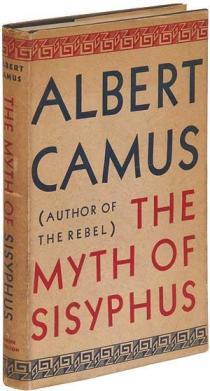

To renowned historian Tony Judt, "Camus' insistence on placing individual moral responsibility at the heart of all public choices cuts sharply across the comfortable habits of our own age" ( New York Review of Books). Awarded the 1957 Nobel Prize for Literature, Camus was "the spokesman of his own generation and the mentor of the next" ( Britannica).

To Camus, "absurdity is the divorce between reason and the world." This perspective, born "in the middle of the Occupation and war, struck a chord with readers recovering from the tragedies of WWII… Camus offered a choice, as he put it, 'between hell and reason.' His influence was widespread and profound" (Carroll, Brave Genius). In this work, published in French the same year as L'Etranger, he places "man and his reason on one side, stark physical reality on the other" (Solomon, Passions, 38). In Myth of Sisyphus Camus introduced his philosophy of the absurd by drawing upon the Greek myth of Sisyphus, condemned to push a boulder up a mountain throughout infinity, only to watch it repeatedly roll down. Octavo, original blue paper boards, original dust jacket.įirst edition in English of one of the earliest and most influential works by Nobel laureate Albert Camus, "the spokesman of his own generation and the mentor of the next." "ABSURDITY IS THE DIVORCE BETWEEN REASON AND THE WORLD": FIRST EDITION IN ENGLISH OF CAMUS' MYTH OF SISYPHUSĬAMUS, Albert.


 0 kommentar(er)
0 kommentar(er)
